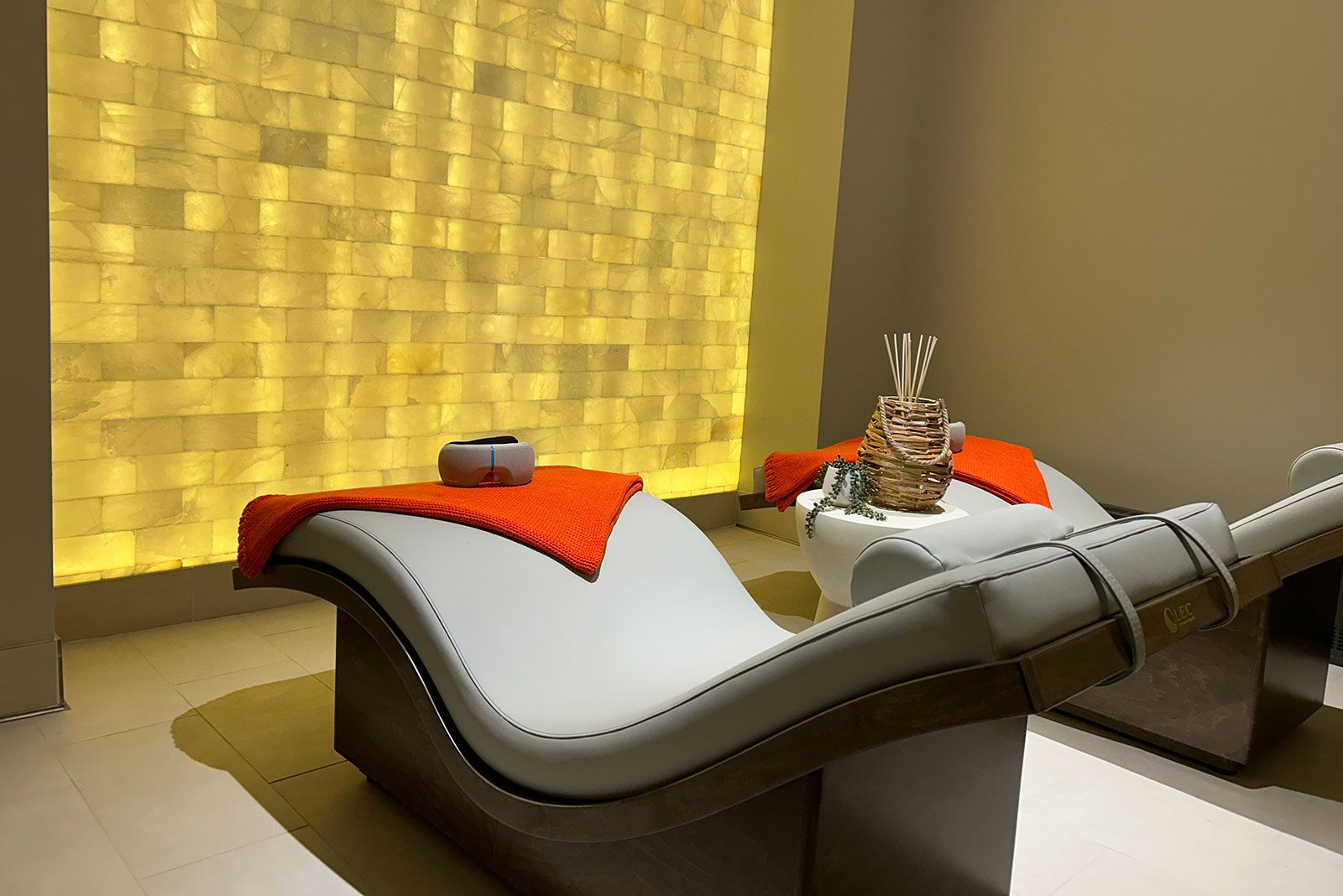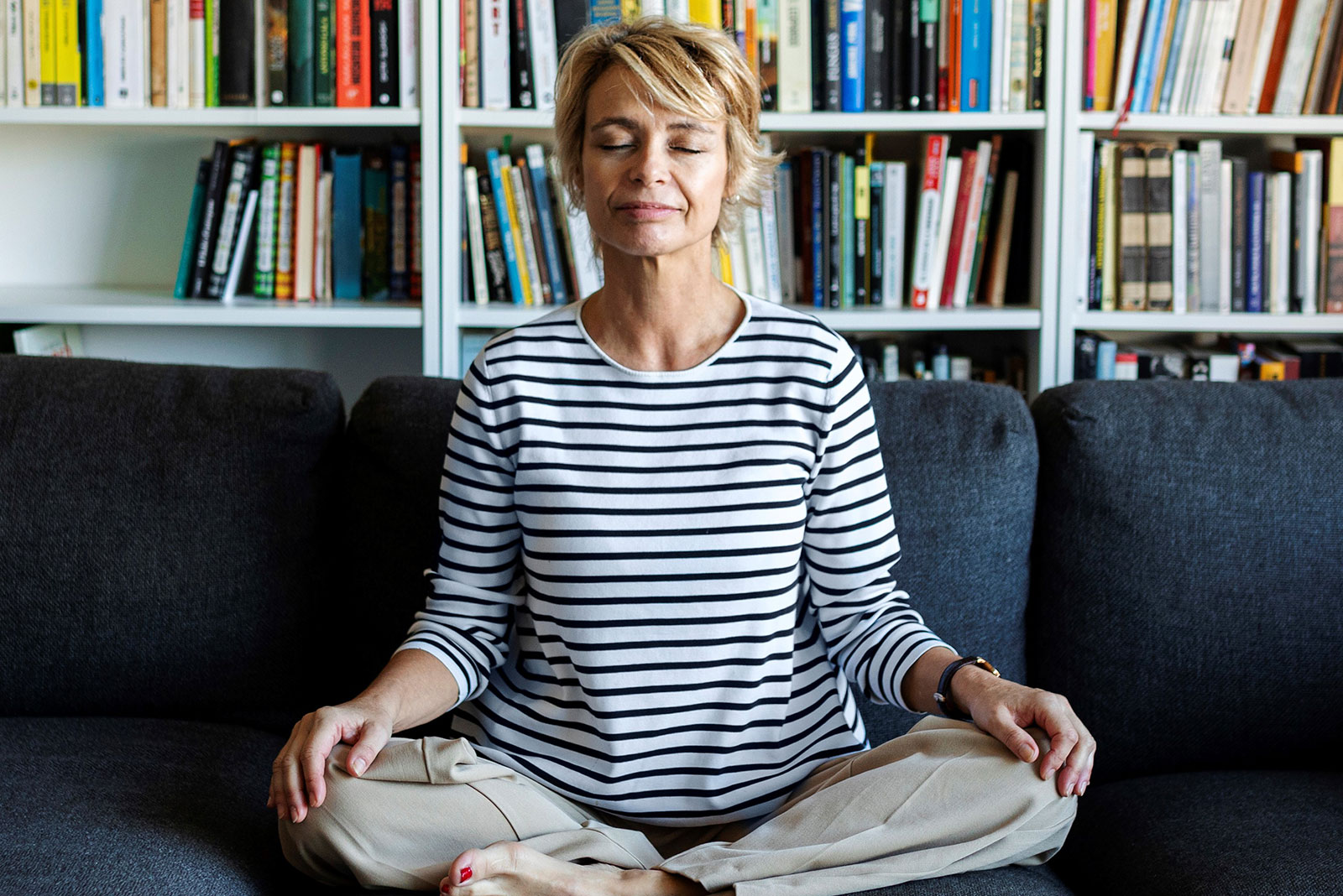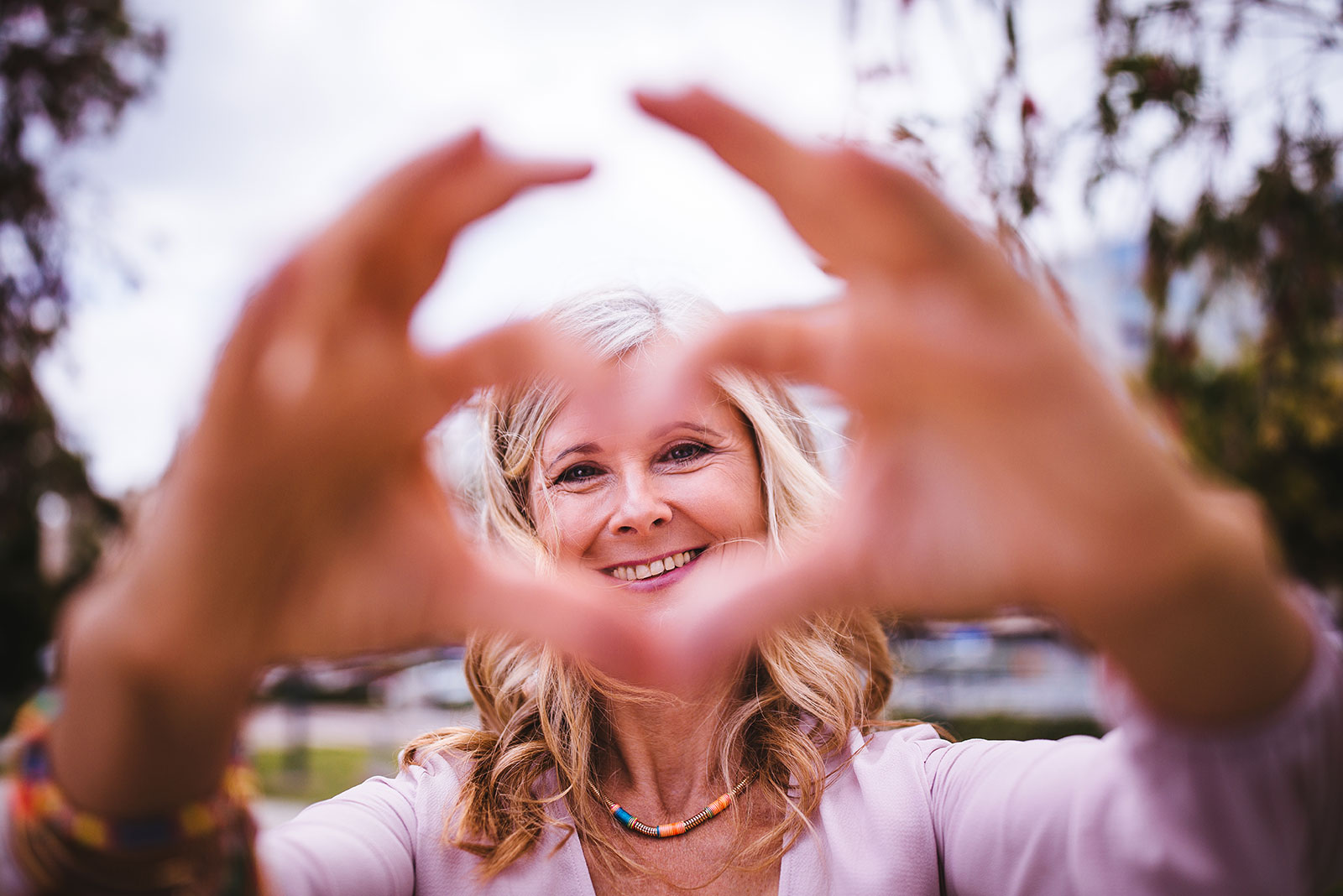
This biweekly column is sponsored by The Mather in Tysons, Virginia, a forward-thinking Life Plan Community for those 62 and better.
Gone are the days when spas were simply places where you would choose from a menu of three or four massage options. Today, trends in day spas and the self-care industry are in step with a broader trend of personalized wellness.
“People today want products and services that are customized to their specific needs, whether related to skin care or body work,” says William Wesley Myers, assistant vice president of wellness strategies for Mather, the organization that recently opened The Mather, a Life Plan Community for those 62 and better in Tysons, Virginia. “This trend is not surprising — it’s similar to what’s happening in other wellness areas, such as boutique fitness centers and exercise studios, the prevalence of personal training, and even individualized dietary supplement plans.”
The spa at The Mather, called Marzenia (the Polish word for hopes or aspirations), offers luxury services that are based on a mix of high-tech and holistic features. For example, residents might begin their spa visit at the Blend Bar, which features a live herb wall, collection of dried herbs and aromatics, and library of global wellness recipes. Working with a spa professional, they can concoct their own unique natural therapies, whether that means mixing a detoxifying mud or making a revitalizing scrub. “We offer a range of solutions that’s as diverse as the needs they meet, each crafted to address specific conditions of the skin and body,” explains William.
Holistic treatments such as this are a powerful spa trend. “People today are more conscious of what they put in — and on — their bodies,” says William. “By offering natural ingredients and therapies, we avoid introducing chemicals and, at the same time, lessen our community’s environmental footprint.” The Mather is working with Comfort Zone, an Italian company that uses natural products with a focus on global sustainability. “We use their line of regenerative, effective, and sustainable face and body products, treatments, and rituals, which are developed in a scientific botanical garden in Parma, Italy,” says William.
Residents of The Mather can also enjoy the all-natural therapeutic benefits of Marzenia’s Breath Lounge, which features a wall of Himalayan sea salt and a halogenerator that releases microscopic salt particles into the air. “Evidence-based research shows that this treatment promotes respiratory health, reduces inflammation, and enhances relaxation,” says William. “Regular sessions can significantly enhance your overall wellness, offering both physical and mental health benefits.”
Another spa trend, which may seem to be the flip side of holistic treatments, is offerings based on technology. “Today’s consumers are not afraid to embrace high-tech options, particularly when we can show them the research backing up the outcomes,” says William.
One example of this is the Gharieni Welnamis spa wave bed, which uses computer-controlled vibrational therapy and audio frequencies to train the brain to relax. Similar to meditation, certain sounds heard through stereo headphones slow mental activity, while the bed’s vibrational frequencies target the body’s energy centers.
“The wave bed can specifically target stress, depression, and poor sleep, as well as headaches and difficulty focusing,” says William. “The technology was developed to treat post-traumatic stress disorders of American veterans — but we offer it to allow residents to select their desired wellness journey.”
Another wellness-tech option available in The Mather: a private sauna, which uses infrared light therapy to boost circulation, relieve muscle tension, and promote cellular renewal. “This advanced technology gently heats the body, promoting deep muscle relaxation, enhancing detoxification, and boosting circulation, all within a comfortably warm environment. It’s an ideal start to stimulate your body’s natural healing process,” says William.
Those interested in self-care have so many more options now than in the recent past; it should be easy to build effective, personalized treatments that target personal goals and needs, whether that treatment involves live herbs or audio frequencies. “Everyone’s wellness journey is unique, and there’s no reason you can’t use a spa visit to create your very own transformative experience,” says William.
The Mather in Tysons, VA, for those 62 and better, is a forward-thinking Life Plan Community that defies expectations of what senior living is supposed to be. It opened in March 2024.

This biweekly column is sponsored by The Mather in Tysons, Virginia, a forward-thinking Life Plan Community for those 62 and better.
Generation X — whose members are currently 43 to 58 years old — has been continually overshadowed by the much larger baby boomer and millennial generations. Yet these days, this “forgotten generation” has moved to the forefront. They are parents; employees and bosses; social, cultural, and political leaders… but who are they?
New research offers a detailed look at Gen X’s key lifestyle trends, attitudes, and interests. The Gen Xperience Study is a five-year research study of Mather Institute, an award-winning resource for research on wellness, aging, and successful aging service innovations. The Institute is the research area of Mather, a not-for-profit organization with other areas of service, community-based initiatives, and luxury senior living communities including The Mather, a Life Plan Community for those 62 and better in Tysons, Virginia.
“The topic of Generation X is important to us for several reasons,” says Raj Radke, Vice President and General Manager of The Mather. “Many of our team members are Gen X; the adult children of many current residents belong to this generation, as do a sizeable percentage of The Mather residents!”
For its Year 1 report, Mather Institute surveyed a nationally representative sample of 2,504 members of Generation X (born between 1965 and 1980). In order to draw comparisons and paint a picture of where Gen Xers might be heading in the future, they also surveyed 2,515 members of the baby boomer generation (born between 1946 and 1964).
“We found that Gen Xers have three clear priorities: family, career, health and wellness,” says Jennifer Smith, PhD, AVP and director of Mather Institute. “Interestingly, we also found that although they are generally satisfied, many of them are also experiencing considerable stress in these same areas.”
For example, it’s no surprise that 81% of Gen Xers are stressed about finances at least sometimes. And — although this generation prioritizes their physical and mental health — nearly one-third of them reported that their wellness is a source of concern: 35% are stressed about their physical health, and 34% are stressed about their mental health. While 96% said that self-care is important to them, two out of five also admitted they don’t get as much self-care as needed.
“We were curious about how these stresses, perspectives, and experiences among Generation X compared to those of baby boomers,” says Jennifer. “We were intrigued to learn that Gen Xers — despite being younger — have more concerns about aging than their boomer counterparts.” The study shows that members of Gen X are specifically worried about their future finances, memory problems, and social isolation. However, when baby boomers think about growing older, they are more concerned about losing their independence.
In short, members of Generation X are doing their best to Age Well. For the most part, they are satisfied with their lives, though many are also coping with stress. The next few years of Mather Institute’s research may reveal changes in both the levels of satisfaction and in stressors.
“The Gen Xperience Study gives us deeper insights into an important generation,” says Radke. “We at The Mather are delighted to have this opportunity to better understand Generation X. We’re looking at ways to apply what we’ve learned from the report to support team members and residents alike.”
The Year 1 findings of the study are available in a free downloadable report, The Gen Xperience: A 5-Year Journey into the Lives of Generation X. You can find it at GenXperienceStudy.com.
The Mather in Tysons, VA, for those 62 and better, is a forward-thinking Life Plan Community that defies expectations of what senior living is supposed to be. It opened in March 2024.

This biweekly column is sponsored by The Mather in Tysons, Virginia, a forward-thinking Life Plan Community for those 62 and better.
When it comes to interior design, green is becoming a popular trend for creating thoughtful, inviting, and aesthetically pleasing living spaces.
Green, of course, is referring to sustainable interior design — a style that emphasizes the use of ecologically and ethically conscious furnishings and materials. It’s a widely appealing approach already making its way into places like The Mather, a Life Plan Community for those 62 and better.
With open floor plans and elegant fixtures, The Mather’s modern apartment homes — some up to 3,300 square feet — are a dream for interior designers like Kelly LaPlante. As a sustainability expert, LaPlante is designing the model apartment homes at The Mather with a heightened perspective on eco-friendly possibilities.
“There are so many more companies who are sustainably minded and are offering eco-friendly products,” LaPlante says. “It’s becoming a much more viable option for everyone.”
Basic sustainable interior design begins with placing an emphasis on longevity and flexibility, while being mindful of product life cycles; in other words, how long the product will be of use before it ends up in a landfill. This puts more responsibility on the designer to prevent materials and products from being discarded if they’re still functional.
Over time, some sustainability pursuits evolve based on the client’s or homeowner’s perspective. For example, a person with health concerns might focus on improving indoor air quality by sourcing low-toxicity carpets, finishes, and paints.
“Sustainable interior design refers to creating spaces that are deeply considerate of the planet and people,” LaPlante says. “There are many factors to it, and one’s focus will depend on their personal values.”
When seeking to lighten your environmental footprint, LaPlante suggests starting with the three Rs:
- Reduce — Reduce waste, especially the act of discarding products just because of it going out of style. Minimize the amount of materials and resources whenever possible. Limit purchasing products made with toxins or poorly made products.
- Reuse — Rather than buying replacement furniture, hold onto pieces that are meaningful to you and find ways to give them new life. Consider what you already own, so you’re not contributing to the need for production and shipping, which are hard on the environment. You can use these items as accents to your decor.
- Recycle — Use repurposed furniture. Mix in vintage or antique pieces — and/or pieces that are made from recycled materials. You can reupholster chairs or sofas, change out legs on chairs and tables, and update hardware like drawer pulls. Be responsible about how you dispose of pieces you are done with by recycling whenever possible.
“As with those moving into The Mather this spring, people moving into a new home will have the opportunity to reuse some of their existing pieces, so I’d always encourage starting there,” LaPlante says. “When you do purchase new items, be diligent about looking for pieces that are well made and will stand the test of time — so that they don’t end up in a landfill in five or ten years.”
Kelly adds another recommendation for those interested in sustainability: purchase organic bedding to set the stage for overall health and well-being. “We spend one-third of our lives sleeping, and that is when we do our deepest restoration,” she says. “So make the healthiest possible choices when it comes to your mattress and bedding; your bed should be a toxin-free zone.”
Making healthy choices in interior design — from comforters to couches — can result in a home that’s as ecologically sound as it is attractive.
The Mather in Tysons, VA, for those 62 and better, is a forward-thinking Life Plan Community that defies expectations of what senior living is supposed to be. It opens in 2024.

This biweekly column is sponsored by The Mather in Tysons, Virginia, a forward-thinking Life Plan Community for those 62 and better.
Research has shown that older adults who engage with the arts in a group setting — anything from dancing to a poetry group to singing in a choir — enjoy tangible benefits in multiple areas of health. This has to do with feelings of mastery, and with social connection.
“This research, combined with Dr. Gene Cohen’s description of life after 50 as a time of potential and inner growth known as the Creative Age, forms a foundation for using creativity to support personal wellness,” says Caroline Edasis, AVP of resident engagement for Mather. Mather is the organization that’s bringing The Mather, a forward-thinking Life Plan Community for those 62 and better, opening in Tysons next month.
Mather encourages residents in their existing communities — not just those who are established artists — to try creating new art forms in Open Art Studios. These studios, which position arts engagement as a vehicle for wellness, not just recreation, inviting both lifelong and new artists to explore their own Creative Age in a welcoming group setting.
“While working in diverse media including ceramics and mixed media/painting, participants often realize alongside their peers that they have an untapped expressive ability, a new love for a specific media, or a personal project to pursue,” says Caroline. “One of our master’s-level facilitators, trained in art and psychology, is present to support each individual’s creative journey, and that person helps transform the group into an uplifting community in which residents learn more about each other and themselves.”
Inquiry-Based Art Viewing
Mather also has a signature approach to art appreciation — one that mirrors how contemporary museum practices are evolving. Rather than teaching or encouraging art appreciation with lectures from an expert such as a docent, they focus on inclusive, inquiry-based art-viewing techniques.
“Did you know that the average person spends 17 seconds looking at a work of art in a museum?” asks Caroline. “In our visual literacy programs, we often spend a full hour describing an image, sharing stories conjured by the work of art, or even creating group poems in response to the work. These techniques focus on the interests, experiences, and curiosity of viewers to deliver intellectually stimulating content while challenging us to bring culture down from the pedestal and into our lives.”
The Mather has already formed relationships with local arts organizations, and plans to offer inquiry-based art experiences for residents on-site in museums, theaters, galleries, and more.
Mather recognizes that creativity is about much more than visual art. They encourage everyone to recognize aging as a time of great creative potential, whether through music, poetry, storytelling, dance and movement, or even gardening — the sky is truly the limit.
The Mather, opening in early 2024 in Tysons, VA, for those 62 and better, is a forward-thinking Life Plan Community that defies expectations of what senior living is supposed to be.

When it comes to sports that you can play for decades, ice hockey is a surprise contender.
“Unlike running, ice skating is very gentle on your knees,” John Dubeck points out. John has been a passionate hockey player for more than 50 years. “It’s a great way to exercise your legs and maintain your balance,” he says. “And it’s an ideal way to get cardio exercise while your focus is on playing well instead of counting the minutes you’ve been running. You’re typically going fast in two-minute bursts, so you’re also improving your anerobic metabolism.”
Since retiring, he plays twice a week at the popular GeriHatricks senior hockey club in West Laurel, Maryland. Currently in Arlington, John and his wife Susan Hotine are planning a move to The Mather, a Life Plan Community for those 62 and better, in Tysons later this year.
“The Mather seems to offer more than other senior living residences we looked at,” says John. “It feels like we’re essentially moving into a place that’s a high-end hotel.” He adds that they are ready to simplify, and like the idea of no longer worrying about leaking roofs and broken water pipes. “Plus, I’m looking forward to moving into a new community with people who are also new there. That appeals to me.”
John began playing hockey at Cornell University in the late 1960s. He says, “That was during the years that Cornell won the NCAA hockey championship, so everyone on campus played intramural hockey — fraternities, clubs, even the student newspaper had a hockey team. The fact that I already knew how to skate gave me a tremendous advantage.” He quickly caught the hockey bug and, after graduating, has played in several different leagues over the years.
“I used to play wing, but as I got older, I moved to defense,” he says. “When I started playing with the GeriHatricks after I retired, I was one of the younger players, so I was immediately told I was a center.” GeriHatricks games are no-check — meaning little or minimal contact — so injuries are few. Their pick-up games last about two hours. “The range of talent there is extraordinary,” says John.
Needless to say, John strongly recommends hockey as a pastime that ages well. A study in the Journal of Sports Science backs him up, showing that physically active men aged 35 and better who regularly play ice hockey are healthier than those who don’t play. They have significantly lower rates of hypertension, heart disease, and diabetes.
And there is a mental health benefit to hockey as well: John points out that attention and calculation are needed throughout the game. “It’s a moving geometry game; you’re always figuring angles because you can play off the boards, and all players are in motion,” he says.
John will continue to play hockey and pursue other interests after his move to Tysons. “The Mather is close enough to where we are now that we don’t have to change our lifestyle. We can still jump on the Metro to see the Caps play,” he says.
The Mather, opening in early 2024 in Tysons, VA, for those 62 and better, is a forward-thinking Life Plan Community that defies expectations of what senior living is supposed to be.

This biweekly column is sponsored by The Mather in Tysons, Virginia, a forward-thinking Life Plan Community for those 62 and better.
Finding a creative outlet that suits you, and then devoting time and thought to that outlet, has wonderful effects on your mood, your brain, and your overall well-being. “Creativity doesn’t have to be painting or sculpting; you can be creative in starting or running a business or nonprofit,” says author Sara Fitzgerald. “For me, I spend a lot of time writing, and I find it very satisfying.”
Sara is a multitalented writer who has applied her talents to crafting everything from satirical song lyrics to nuanced biographies. A resident of northern Virginia for nearly 50 years, she is preparing to move to The Mather, a Life Plan Community for those 62 and better, in Tysons in early 2024.
Early in her career, Sara was an editor and new media developer for The Washington Post, then held positions focused on internet policy making and promoting technology in education. While she continued to write during those years (including publishing two romance novels), she says retirement offers the time and concentration she needs to devote herself to it.
“There’s something about the way writing stimulates my mind — there’s a kind of high,” says Sara. Since retirement, she’s been focused on historical fiction and biographies of little-known women. She’s in the process of publishing a biography of Emily Hale, the secret love of poet T.S. Eliot. (You can browse all her published works on her website at sarafitzgerald.com.)
However, Sara’s writing isn’t limited to books: “I enjoy rhyming lyrics — I’ve written them for the Hexagon Club’s annual satirical revue in D.C. for years,” she says.
And, after taking a brief playwriting class at the Creative Cauldron theater in Falls Church, she wrote a script for a very personal cabaret-style show, Comfort Songs, which was performed in July 2023 at the Creative Cauldron. She explains, “During the early days of the pandemic, I was inspired by Yo-Yo Ma, who put out a call for ‘songs of comfort’ and who posted videos of himself playing the cello. I began posting my own videos; I used my mobile phone to record daily videos of myself playing the piano — one song a day for nearly 90 days.” In her show, Sara described the project and the background of the songs she selected, and “some talented friends” performed about 15 of them. “I wanted it to be a healing experience; I think it worked well,” she says.
Sara is looking forward to her next chapter at The Mather. “What’s reassuring to me about my decision to move to The Mather was that nine or ten households of my friends have also decided to move there,” she says. “I then learned about friends of friends moving there — including the two neighbors on either side of my future apartment home!”
While she hopes to enjoy more time to regularly practice piano in her apartment home at The Mather as she admires the views from floor-to-ceiling windows, Sara is simultaneously excited about the community’s amenities, including an indoor pool, and looks forward to meeting new people. “I figure I’ll be able to sit down with any of my neighbors and find interesting people whom I would like to know,” she says.
The Mather, projected to open in Tysons, VA, in early 2024 for those 62 and better, is a forward-thinking Life Plan Community that defies expectations of what senior living is supposed to be.

This biweekly column is sponsored by The Mather in Tysons, Virginia, a forward-thinking Life Plan Community for those 62 and better.
For many, the holiday season includes traditions, expectations, commitments — and rising levels of stress. If you are among those who feel their stress levels rising at this time of year, try an easy solution: mindful meditation.
Myriad studies have shown that a regular meditation practice can reduce stress and physically change the brain so that you have greater capacity to continually manage stress. Learning to avoid stress saves a lot of wear and tear on your body as well as your brain.
Mindful meditation refocuses the attention, calming the mind and lowering blood pressure and heart rate. A morning meditation session of even a few minutes can help you manage stress throughout your day.
As you learn to focus, you’re training your attention and your ability to tune out the information overload and jumbled thoughts we live with constantly — and better attention means a sharper memory. Additionally, studies show that meditation can actually grow, or increase the volume of, areas of the brain responsible for:
- complex cognitive processes including planning, goal setting, decision making, attention, and short-term memory
- positive mood
- improving awareness of body, gut feeling, and empathy
- long-term memory
Types of Meditation
Meditation is simple and takes as little as a few minutes a day. But remember — if you want to enjoy the benefits above, you’ll need to meditate regularly, and ideally that means every day.
Here are a few types of meditation to consider:
Mindfulness sitting meditation is the most common form of meditation. Sit comfortably with your back, neck, and head straight but not stiff. Concentrate on your breathing and the sensations it creates. When your mind wanders or you become distracted, gently return your focus to your breath. Try this for just five minutes at first, gradually increasing the time.
Visualization meditation involves mental visualization of an image, which is usually meaningful or religious. While you meditate (as above), you try to mentally visualize your chosen image in as much detail as possible. As you do so, you may also reflect on the meaning of your image.
Walking meditation is similar to sitting meditation. Slowly and comfortably walk, focusing your attention on each step, the movement of your body, and the feel of each foot on the ground. When your mind wanders, gently bring it back to the movement of walking.
Loving-kindness meditation focuses on practicing compassion. As you practice cultivating feelings of loving kindness, gradually move your focus from feeling this toward yourself, then to loved ones, and then to people who are less close to you.
Look for a local meditation class, or purchase audio recordings of guided meditations. Once you’ve mastered the basics of your chosen type of meditation, it will become a matter of practicing — and enjoying the benefits that come with it.
The Mather, projected to open in Tysons, VA, in early 2024 for those 62 and better, is a forward-thinking Life Plan Community that defies expectations of what senior living is supposed to be.

This biweekly column is sponsored by The Mather in Tysons, Virginia, a forward-thinking Life Plan Community for those 62 and better.
How does your plan for the future look? If you’re a planner, you’ve already got your investments and assets figured out, and your estate plan in order. But there are other important aspects of planning that are often ignored — such as laying the groundwork for your future quality of life.
More and more people are considering the solid advantages of Life Plan Communities. These age-restricted, amenity-rich communities invite people to live on their own terms, enjoying a host of services and opportunities, along with the added benefit of access to on-site health care services, if ever needed.
A local example of this is The Mather, a Life Plan Community opening in early 2024 in Tysons, Virginia, for those 62 and better.
An Engaged Lifestyle
Because you move into a Life Plan Community while you’re independent, you can take full advantage of the rewarding benefits of living there. At The Mather, residents will enjoy amenities such as:
- A fitness center with cardio and strength-training equipment, group classes, personal training options, and more
- A heated, saltwater lap pool, whirlpool, and sauna
- Inspiring social, educational, and cultural programs, such as digital media workshops, live music, art technology seminars, and featured lecturers
- An art studio for exploring creativity through art classes and collaborative Open Art Studio sessions
- A spa offering signature services like facials and massage, with a Himalayan salt wall and more
These and other amenities and services are designed to meet the needs and desires of today’s older adults — and they also support overall wellness.
Proven Benefits
A national, five-year study revealed clear associations between living in a Life Plan Community and enjoying better health. The Age Well Study is a large-scale national study conducted over five years by Mather Institute, involving a total of 8,228 residents living in 122 Life Plan Communities around the US.
The Age Well Study compared the health and well-being of people who live in Life Plan Communities to a demographically similar sample of older adults living in the community at large. The findings reveal that residents of Life Plan Communities reported better physical, emotional, intellectual, social, and vocational wellness than their community-dwelling counterparts over a five-year span, with more favorable ratings in social and intellectual wellness in particular.
Highlights of the findings include:
- In Year 5, Life Plan Community residents exhibited better self-reported health and higher levels of moderate physical activity compared to older adults from the community at large.
- From Year 1 to 5, social contact significantly increased for residents.
- From Year 1 to 5, overall engagement in intellectual activities significantly increased for residents and decreased for older adults in the community at large.
- Changes in emotional and spiritual wellness were more favorable for older adults in the community at large, while the two groups reported similar changes over time in physical and vocational wellness.
The Age Well Study’s statistical models examined 1) differences in wellness between groups (residents from Life Plan Communities vs. older adults from the community at large), 2) changes in wellness over time (Year 1 vs. Year 5), and 3) whether the changes in wellness were different for Life Plan Community residents compared to the community-at-large respondents. Analyses controlled for age, gender, income, education, and marital status.
The increase in social contact within Life Plan Communities is not surprising, since in a community like The Mather it’s easy to find neighbors with similar interests to form a hiking club, theater-going group, or other social groups.
These research findings support the fact that, for those making a plan for their future, Life Plan Communities like The Mather are worth a closer look.
The Mather, projected to open in Tysons, VA, in early 2024 for those 62 and better, is a forward-thinking Life Plan Community that defies expectations of what senior living is supposed to be.

This biweekly column is sponsored by The Mather in Tysons, Virginia, a forward-thinking Life Plan Community for those 62 and better.
If you’re looking for an easy way to improve your physical health and mood, just breathe.
The practice of breathwork, or the intentional manipulation of your breathing, has been gaining attention, thanks to the widespread popularity of yoga and meditation. However, researchers have been studying the benefits of breathwork for years.
“Breathing is not new — it’s the most essential thing we do for our bodies — but breathwork is a new approach to wellness,” says William Wesley Myers, Mather’s director of wellness strategies. Mather is a not-for-profit organization with three senior living communities that plans to open The Mather, a Life Plan Community in Tysons in early 2024.
Breathwork has many health benefits; you can use it to increase or decrease your energy, to calm your mind, and to help you focus, among many things.
“Physical benefits from deep breathing are often instantaneous,” explains William. “There is a direct relationship between breath rate, mood, and systems that activate our fight-or-flight or rest-and-restore responses, which directly affect heart rate, respiration, and digestion.” Research has shown that deep, mindful breathing carries benefits to these systems and more.
Emotional Health: One study showed that manipulating the breath can cause up to a 40% variance in emotions. Evoke joy by breathing and exhaling slowly and deeply through the nose. Other research shows breathwork can help to treat anxiety, PTSD, and severe depression, even in those who don’t respond well to antidepressants.
Blood Pressure: A regular practice of slow, deep breathing is an effective way to reduce blood pressure.
Stamina: An Italian study found that the lungs of mountain-climbers who practiced slow breathing an hour a day for two years maximized oxygen better, allowing the climbers to forego supplemental oxygen needed by others to summit Mount Everest.
Focus: Breath-focused yoga can sharpen participants’ attention spans and focus by changing brain chemistry.
Pain Management: Multiple studies have shown that slow, deep breathing can reduce perception of chronic pain, or help people cope with discomfort. Breathwork can be especially effective with back pain.
Longevity: Research has shown that breathwork improves metabolism and reduces inflammation — both of which contribute to longer life.
“People can all benefit from doing a little breathwork,” says William. “You can do some simple breathing exercises sitting on the edge of a chair with your feet flat on the ground. Even five minutes of breathwork offers benefits!”
The Mather, projected to open in Tysons, VA, in early 2024 for those 62 and better, is a forward-thinking Life Plan Community that defies expectations of what senior living is supposed to be.

This biweekly column is sponsored by The Mather in Tysons, Virginia, a forward-thinking Life Plan Community for those 62 and better.
Thanksgiving may be a month away, but every day is a good day to focus on feeling thankful. That’s because concentrating on feelings of gratitude helps you feel happier and more positive in the short and long term.
“Multiple research studies have examined the benefits of a simple gratitude practice,” says Jennifer Smith, PhD, AVP and director of research at Mather Institute. The Institute is the research arm of Mather, a not-for-profit organization with three senior living communities that plans to open The Mather, a Life Plan Community for those 62 and better, in Tysons in early 2024. The Institute is an award-winning resource for research and information about wellness, aging, trends in senior living, and successful aging service innovations.
“Gratitude can help us feel more connected to others, increase positive emotions, and reduce negative thoughts,” says Dr. Smith. “And emphasizing the positive can create more positivity.”
The Gratitude-Happiness Link
Many studies have linked higher levels of gratitude to more happiness and satisfaction with life; in other words, it seems the more one feels gratitude, the happier and more satisfied one feels in general. One study that earned an Innovative Research on Aging Award from Mather Institute points out that older adults consistently report the highest levels of gratitude, compared to middle-age and younger adults. That link between level of gratitude and overall life satisfaction does not change with age, which means those over age 60 have a “happiness advantage” due to their high levels of gratitude.
The good news is that you can practice gratitude at any stage of life to actually improve your happiness, positivity, and life satisfaction. One study showed that a regular habit such as daily journaling can enhance your long-term happiness by more than 10%.
Feelings of gratitude have also been shown to make us more resilient, boost optimism, increase self-esteem, and reduce depressive symptoms. Focusing your attention on the positives rather than the negatives — which is what a gratitude practice does — can actually switch your outlook for the long term.
Physical Health Benefits
Feeling grateful also carries some physical benefits. It seems obvious that feeling optimistic and generally positive would impact one’s blood pressure, and research confirms this. A study of people with hypertension who were asked to practice gratitude at least once a week showed a “significant decrease” in their blood pressure. A similar study showed that practicing gratitude can improve quality of sleep.
Give Gratitude a Try
If you want to enjoy the benefits mentioned here, try to focus on feeling grateful at least three times a week, if not daily. Here are some examples of habits you might adopt:
- Gratitude journal: Whether you use a special notebook or scrap paper, take time every day or evening to list five things you feel grateful for. Ideally, you’ll save your lists so you can look back on them over time. Reviewing them will also increase your positive feelings.
- Thank-you notes: Write a note or email to someone who has had a positive impact on your life — whether it was a single action or a lifetime of support. Expressing your gratitude in writing gives you a chance to think more deeply about your thankfulness — and will make the recipient happy!
- Gratitude meditation: Take some quiet time to reflect on what you’re grateful for, then examine the feelings brought up when you identify those items, people, or experiences. Focusing on what you value will bring moments of peace and joy.
- Share gratitude: Find a “gratitude buddy” — perhaps your spouse, child, or a close friend — and take turns listing a few things you are grateful for. This adds extra depth to gratitude, as you can build off of each other’s comments.
- Take a gratitude walk: Take a stroll and look for positive things — from the walkability of your neighborhood to appealing sights and friendly people.
Whether you’re a natural pessimist or an optimist, try a regular gratitude practice. It will improve your outlook right away, and could result in lifelong benefits.
The Mather, projected to open in Tysons, VA, in early 2024 for those 62 and better, is a forward-thinking Life Plan Community that defies expectations of what senior living is supposed to be.

